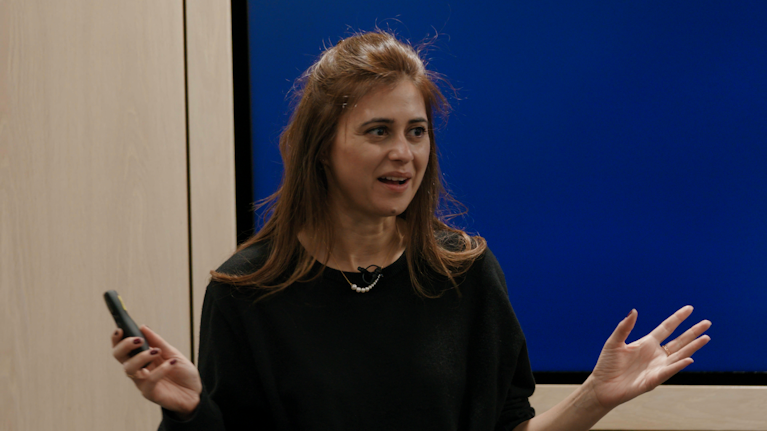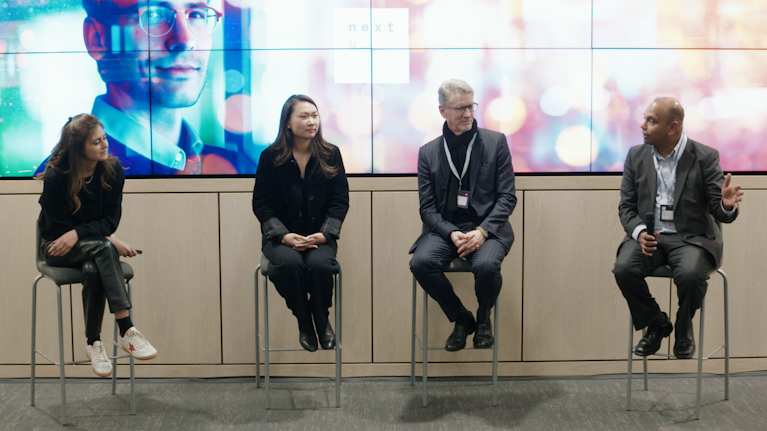
Be curious, be considered – AI commitments for 2025 from our Soirée
Tags
“What we’ve all learned in the last 18 months has been extraordinary. And optimism comes from the fact that we’re all in the same place now… we’re all in the trenches trying to have a conversation about how to use AI. So, nobody is behind. And this is an invitation for us all to join the conversation.”
The words of Anna Wang, Head of AI at Multiverse, spoken at our AI Soirée, neatly summarise the AI journey of many organisations over the previous year and a half. And as we step into 2025, Anna’s words pinpoint the need for leaders to act with curiosity and intentionality as they seek to extract organisational value from AI.
Our gathering brought together in-house experts with leading practitioners, investors, academics, and interested parties. Together, we discussed five key AI challenges, the role of AI in creativity, and the need to address skills gaps.
Five key challenges
The event opened with a discussion around the five key challenges that my colleagues and I often encounter with clients seeking to maximise the value of AI in their business.
The first comes from the fact that developing AI use cases, and becoming excited about the potential productivity and efficiency benefits of AI, is easy. But putting together the “total cost of ownership” is hard, and this is where progress often falters.
A second major challenge comes with moving from proof-of-concept and proof-of-value, through to where AI becomes a business process that either dramatically improves efficiency, or helps to reimagine the core of the business.
The third lesson we’ve encountered is enablement; getting everyone in the business – from those in the boardroom right down to practitioners – to be comfortable conversing about, and using, AI.
As a natural follow-on, the next lesson is the idea of the appropriate governance lens to apply, and how leaders can ensure they use AI in a fair, transparent, robust, and accurate way.
Finally, clients often struggle to build what we call their ‘sustainable execution muscle’. If you think about any new recruits you bring into your business, you wouldn’t instantly dismiss them for not getting something straight away. You’d train them. And leaders need to start applying the same principle to AI systems to build that muscle – rather than rejecting it at the stage where it’s still ‘learning’.

Creativity in the era of AI
These challenges sparked conversation among our panellists and audience. And they set the stage for the speech from our keynote speaker Suhair Khan, the founder of ‘open-ended’ – a platform and incubator for creative technologists working with AI.
Suhair explored the philosophical, legal, and societal questions around AI; and how the future of AI will be cross-disciplinary – encompassing art, culture, philosophy, language, and policy.
While acknowledging the challenges ahead, Suhair reminded us of the creative possibilities of AI. And she urged the audience not to think of AI as something that is standalone. She drew links between AI and other advancements such as semiconductors and quantum, as well as AI’s “inherent” link to scientific research and development.
AI will, according to Suhair, help us unlock the past – and reimagine the future. Examples included AI being used to read otherwise ‘lost’ scrolls recovered from the ruins of Pompeii, and its potential future uses to predict epileptic seizures and restore sight.

Upskilling for the future
One recurring theme from our event was the need to bridge the gap between potential and value realisation.
For Anna, “intentionality is really important” to drive progress. She highlighted the difference in the number of organisations investing in AI compared to those utilising it. “If you’re going to invest in AI, invest in the use cases and the training as well”, she added.
Dr Mark Kennedy, who along with Alwin co-founded the Data Science Institute at Imperial College London, added that unless leaders know exactly how to apply AI in a very specific use case, then “potential and what’s realised are completely different orders of magnitude”.
Our discussion closed with a personal reflection on what we call “the intelligent enterprise” – the shift towards an organisation where every single concept and workflow is powered by AI – with a human expert in the loop.
The conversations gave us shared belief in the value that can be gained by pursuing AI progress with a considered, curious, and intentional attitude.
Explore more










